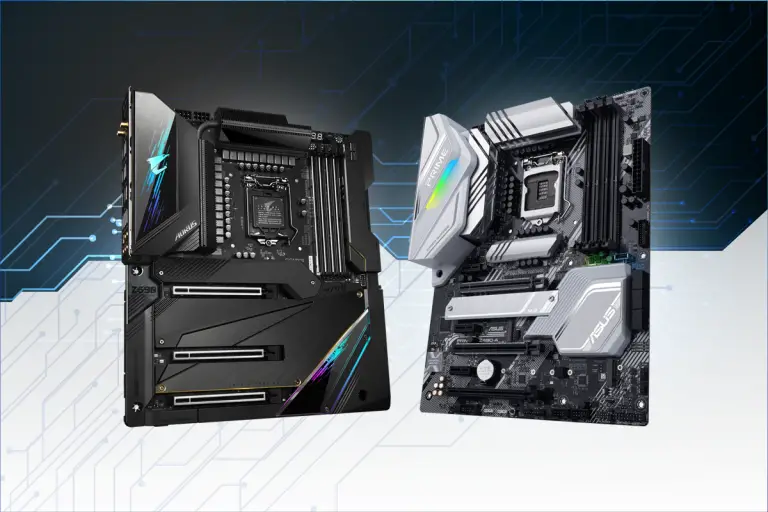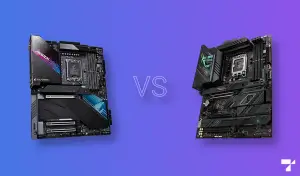Intel’s premium Z590 motherboard chipset has finally been revealed for the launch of Intel’s 11th Generation Rocket Lake processors. With Z590 motherboards featuring the same LGA1200 socket and support for older 10th Generation Intel CPUs, many want to know if it’s worth buying the newer Z590 motherboard or saving money by going with an older Z490 chipset. We’ll be going in-depth and analyzing the main differences between Z590 vs Z490 motherboards and recommending the right processors for each one of them in this article.
Z590 vs Z490 Motherboard Specs & Comparison
| Chipset | Z590 | Z490 |
|---|---|---|
| Supported CPUs |
|
|
| Chipset Link | DMI x8 (11th Gen only) | DMI x4 |
| PCIe 4.0 lanes | 0 | 0 |
| PCIe 3.0 lanes | 24 | 24 |
| SATA 6.0 Gb/s Ports | 6 | 6 |
| USB 3.2 Gen 2×2 (20Gb/s) Ports | 3 | 0 |
| USB 3.2 Gen 2×1 (10Gb/s) Ports | 10 | 6 |
| USB 3.2 Gen 1×1 (5Gb/s) Ports | 10 | 10 |
| USB 2.0 Ports | 14 | 14 |
Differences between Z590 and Z490 Motherboards
Processor PCIe 4.0
Intel’s 11th Generation Rocket Lake processors will launch with PCIe 4.0 support. Meaning you will now be able to utilize the fasters speeds of devices such as PCIe 4.0 SSDs. Although Intel 10th Gen CPUs did not support PCIe 4.0, Intel equipped the Z490 chipset to support PCIe 4.0 on future 11th gen processors. However, with some board partners like Asus PCIe 4.0 support lacking on their Z490 motherboards, we would recommend the Z590 if you plan to go with 11th Gen CPUs.
Connectivity
The Z590 chipset being released recently comes equipped with a suite of new connectivity options. The first of these new ports is native support for the USB 3.2 Gen 2×2 port, allowing for a maximum transfer rate of 20 Gbps. Some Z490 board manufacturers did include the port in their motherboards with the help of an ASMedia chip connected directly with the motherboard’s PCIe lanes.
The next connectivity improvement is the Maple Ridge Thunderbolt 4 controller. Though the transfer rate is identical to Thunderbolt 3, features like support for 8K displays, additional security, support for longer cables, and tree chaining make the new standard a worthwhile consideration, especially with more powerful integrated graphics baked into the 11th Gen CPUs.
CPU-Chipset Link
The Z590 chipset now has eight lanes of DMI connectivity with the processor, double that of the previous Z490 chipset. The increased lanes allot enough bandwidth to the chipset for 8x PCIe 3.0 lanes, supporting up to two M.2 SSDs at maximum speed. However, this feature is only available for 11th Gen processors, and the older 10th Gen processors will switch x4.
Memory Support
The new Z590 motherboards will support a maximum memory frequency of DDR4-3200 compared to the DDR4-2933 of the older Z490 chipset. The motherboards will theoretically support a frequency of up to DDR4-5333, though it’s costly, and you lose warranty protection due to overclocking. If you are planning on utilizing faster RAM, the Z590 is a better choice for you.
Z590 and Z490 Supported Processors
- 11th Generation Intel Core i3 processors
- 11th Generation Intel Core i5 processors
- 11th Generation Intel Core i7 processors
- 11th Generation Intel Core i9 processors
- 10th Generation Intel Core i3 processors
- 10th Generation Intel Core i5 processors
- 10th Generation Intel Core i7 processors
- 10th Generation Intel Core i9 processors
Who is the Intel Z590 chipset for?
The Intel Z590 is the best chipset for the new 11th Generation Rocket Lake processors. Extra features like PCIe 4.0, more recent data transfer standards, and higher frequency RAM support are great for those looking to push their hardware to the limit for the best performance. If you already have a Z490 motherboard and are looking to upgrade, we recommend you first test it out with a Rocket Lake CPU first before buying a newer Z590 motherboard.
Why you should buy a Z590 motherboard
Better chipset expansion
The larger bandwidth of the Z590 chipset due to the doubling of lanes in the DMI link between the chipset and the processor is an excellent way for motherboard manufacturers to add additional devices and slots for storage, network, and more. Manufacturers that decide to include two M.2 slots can take full advantage of this and offer two slots with full PCIe 3.0 x4 speeds.
PCIe 4.0 with 11th Gen CPUs
The 11th Gen CPUs that come with PCIe 4.0 need both a supported chipset and motherboard. While all Z590 motherboards will include support, many Z490 options from manufacturers like ASUS have left out hardware support as Intel did not enforce it due to the lack of PCIe 4.0 in the 10th Gen processors. PCIe 4.0 not only offers better performance but much more expansion that can be utilized for extra slots, network devices, and high-speed peripherals.
Improved connectivity
The newer Z590 motherboard comes equipped with the latest peripherals that include USB 3.2 Gen 2×2 that supports up to 20 Gbps speeds and Thunderbolt 4. If you believe that your work can significantly benefit from these additional ports, then the Z590 is the choice you must go with. Furthermore, the extra PCIe 4.0 lanes can also be configured for faster networking and connectivity, which depends upon motherboard manufacturers.
CPUs we recommend using with Z590 Motherboards:
- 11th Generation Intel Core i5 processors
- 11th Generation Intel Core i7 processors
- 11th Generation Intel Core i9 processors
- 10th Generation Intel Core i9 processors
Who is the Intel Z490 chipset for?
The Z490 is an ideal chipset if you’re looking to go with an Intel 10th Generation processor. The lack of PCIe 4.0 support in some motherboards, slower chipset bandwidth, and connectivity options are the main factors that make Z490 a bad choice for Rocket Lake CPUs, even though they are supported. We believe the extra features are worth the price difference between the two generations.
Why you should buy a Z490 motherboard
Cheaper than equivalent Z590 options
The Z490 being, an older generation chipset, will see price cuts as the newer Z590 launches. Remember that Intel launched the Z490 chipset for a premium lineup of motherboards, so features like high-quality components, effective VRMs, and power delivery systems will still be available without the need to pay up for a Z590 chipset.
A better option for regular users
If you’re a regular buyer, chances are specs like PCIe 4.0 support, USB 3.2 Gen 2 x2, and memory overclocking are not necessary for your workflow. In such scenarios, the Z490 is a better choice to go with, even for the i3 and i5 family of Rocket Lake processors, as the cost savings is significant, and can help you get a better component like the SSD or GPU.
Intel 10th Gen CPUs do not benefit from Z590
As we’ve seen, the 10th Generation Intel Core processors do not support features like PCIe 4.0. Add to this the slower bandwidth between the older processor and the chipset that will further remove functionality from Z590 motherboards. Unless you are looking to go with a high-end 10th Gen processor like the Core i9-10900K and plan to overclock it with high-frequency RAM, we would recommend against going with a Z590 motherboard.
CPUs we recommend using with Z490 Motherboards:
- 10th Generation Intel Core i3 processors
- 10th Generation Intel Core i5 processors
- 10th Generation Intel Core i7 processors
- 11th Generation Intel Core i3 processors
- 11th Generation Intel Core i5 processors
Final thoughts
While the generational difference between Z590 and Z490 chipsets may not be significant, each chipset distinguishes itself as a suitable option for the processor it’s intended to run with it. If you’re upgrading from an existing 10th Gen Intel processor, it’s better to stick with Z490 and test things out and see if it’s adequate for your workflow before going with Z590.
Those who already have purchased a 10th Gen processor like the i9-10900K and need a motherboard can also benefit from the better memory support on the Z590 motherboards, so picking one up is reasonable and futureproof.
Those who plan to use their PC for lighter tasks and don’t need the extra connectivity, faster peripherals, or PCIe 4.0 support can opt for a Z490 even with 11th Gen processors from the i3, and i5 lineups, saving money in the process. In the end, however, it all comes down to what you want and feel is best for your use case.



